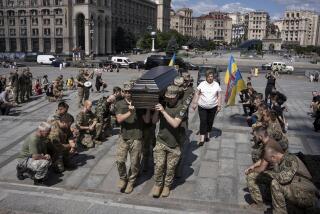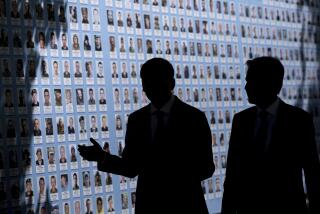Ukraine protest blocks access to government building; strike declared
KIEV, Ukraine -- Protesters blocked access to the governmentâs headquarters in central Kiev on Monday and declared a general strike as Ukraineâs most serious political crisis since the Orange Revolution of 2005 reached the countryâs far-flung regions and towns.
Hundreds of opposition activists surrounded the Council of Ministers building, parking several lines of cars in strategic spots around it and blocking doors and gates with lines of people waving blue-and-yellow national flags. A huge European Union flag, with its circle of yellow stars against a blue background, was affixed to the back metal gates of the building.
Ukraineâs government has been shaken in recent days with a massive outpouring of opposition to a decision by President Viktor Yanukovich to forgo signing an agreement that would have given Ukraine closer economic ties with the EU. Russia, Ukraineâs eastern neighbor and largest energy supplier, opposed the accord and had threatened retaliation if Yanukovich signed it.
[Updated 2:52 p.m. Dec. 2: Yanukovich spoke by phone Monday with European Commission President Jose Manuel Barroso, proposing to send a delegation to resume discussions about the EU trade agreement, the Interfax-Ukraine news agency reported. Barroso reportedly agreed, but said the European Commission was not willing to renegotiate the deal.]
Once known as the breadbasket of the Soviet Union, Ukraine has been torn between a desire to integrate with Western Europe and a need to remain economically integrated with Russia.
Speaking to cheering supporters outside the Council of Ministers building, opposition leader Yuri Lutsenko declared that the government headquarters had been effectively shut down by the demonstration.
âI am happy to announce that the Council of Ministers was the first organization that joined the general strike we declared,â announced Lutsenko, who served as Interior minister in the government of former Prime Minister Julia Tymoshenko. He spent two years in jail on a charge of abuse of office and was released this year; Tymoshenko remains imprisoned.
Government spokesman Vitaly Lukyanenko told the Interfax-Ukraine news agency that government employees blocked from their offices were working remotely from their homes.
Government buildings were also reported to be surrounded by protesters in western Ukraine, which has been the center of support for closer ties with Europe. Yanukovich retains substantial support in eastern Ukraine.
Mondayâs demonstrations were peaceful, in sharp contrast to the day before, when protests outside the presidential headquarters building ended in several hours of pitched battles between protesters and police.
The fighting, involving clubs, cobblestones, bricks and tear gas, injured 140 police officers and 165 protesters, many of them hospitalized.
Yanukovich, whose resignation is the key demand of the opposition, called for peaceful dialogue.
âI am convinced that even a bad peace is better than any war,â Yanukovich said in an interview with local television networks at his country residence near Kiev. âIt is very important that these [protest] actions would always be peaceful.â
Lawmakers on the Crimean Peninsula, which has a large ethnic Russian population and has been supportive of Yanukovich, called on him to declare a state of emergency in the country.
Russian President Vladimir Putin, who is widely believed to have pressured Yanukovich to refrain from signing the EU agreement, condemned Sundayâs violence in Kiev.
âThe events in Ukraine look more like a pogrom than a revolution,â Putin said to the RIA Novosti news organization.
The Ukrainian opposition has set up camp in Independence Square in central Kiev, installing tents and barricading the perimeter with various construction materials and parts of a huge artificial Christmas tree that authorities had planned to erect there last week.
The ranks of protesters shrink to several thousand people during the night and swell during the day as activists listen to opposition leadersâ speeches and to musical performances. At one point Monday, a group of priests led the group in prayer.
The perimeter, initially protected by young students, is now guarded by burly army veterans.
âIf any riot police force or even army troops dare attack they will have to deal with us first, and I am sure that will not be something to their liking,â said Pavlo Kovalchuk, 48, a Soviet veteran of Moscowâs war in Afghanistan who is the head of the protest campâs security.
Former world super heavyweight boxing champion Vitali Klitschko, a leading opposition figure, warned that the opposition still expects provocations from the government.
âI canât say that we have reached a breakthrough point in our struggle,â Klitschko said in an interview. âThe first stage in our plan is the resignation of the government, which as we demanded will be discussed in parliament Tuesday. But we need the reset of the entire system of power in our country, which now is working not for the benefit of the country but for a benefit of a handful of people in power today.â
One expert suggested that both sides were making mistakes in their tactical moves.
âThe opposition leaders keep demanding that the authorities be toppled, which could be the mechanism to reach some goal, but they never really explained properly what their goal is,â said Kost Bondarenko, director of the Ukrainian Policy Institute, a Kiev-based think tank.
âYanukovich is making even a bigger mistake,â he added, âas he is still planning to go on a three-day visit to China on Tuesday. I wouldnât be so careless in his place. There may be no place for him to return to in three days.â
ALSO:
Senators say theyâll press Iran sanctions as âinsuranceâ
Israel to consider extending tax breaks to same-sex couples
New sticking point between U.S. and Afghanistan: fuel supplies
More to Read
Sign up for Essential California
The most important California stories and recommendations in your inbox every morning.
You may occasionally receive promotional content from the Los Angeles Times.










